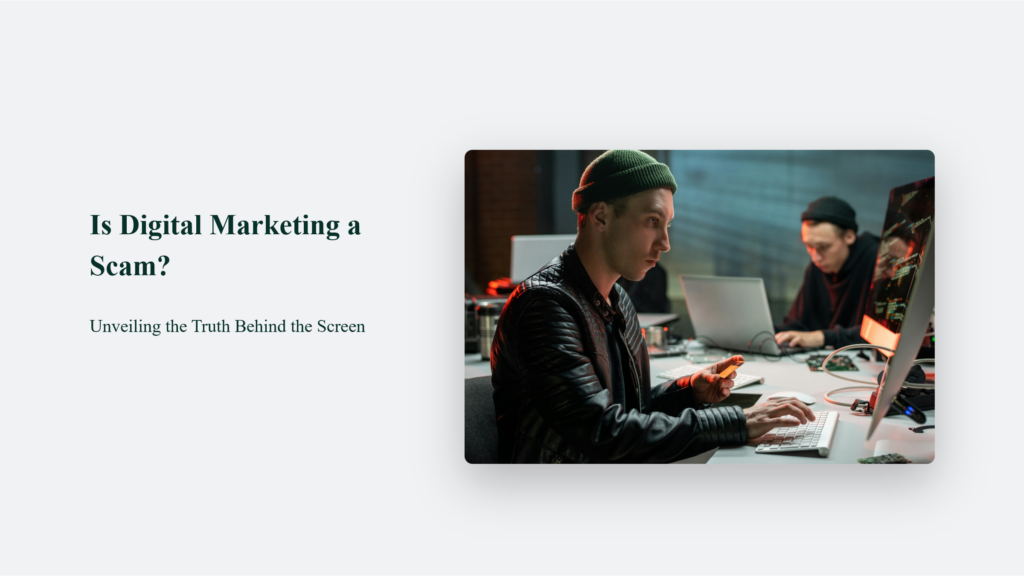In the ever-evolving digital age, the prominence of digital marketing has skyrocketed, becoming an indispensable tool for businesses aiming to thrive online. Yet, as its significance grows, so do the questions surrounding its legitimacy. “Is digital marketing a scam?”
This question has echoed through forums, social media, and discussions among entrepreneurs and marketing professionals alike.
To address this query, we delve into an analysis that combines industry insights, expert opinions, and empirical data to separate myth from reality.

Key Takeaways
- No Shortcuts to Success: Achieving a strong online presence requires time, effort, and adherence to white-hat SEO practices. There are no legitimate shortcuts.
- The Importance of Due Diligence: Businesses should thoroughly research digital marketing agencies before engaging their services. It includes examining past campaigns, reading testimonials, checking online ratings, and verifying accreditations.
- Transparency and Communication: A trustworthy digital marketing partner should be open about their strategies, provide regular updates, and be willing to answer questions. Lack of transparency is a significant red flag.
Understanding the Essence of Digital Marketing
At its core, digital marketing is a multifaceted strategy designed to target, reach out to, and build relationships with customers online across various platforms. From social media to search engines, digital marketing encompasses a range of tactics, including content marketing, email campaigns, and search engine optimization (SEO), each to promote businesses, products, or services.
Is Digital Marketing a Scam: The Skepticism
The skepticism around digital marketing is fueled by the prevalence of scams that exploit businesses and consumers alike. These scams exploit the digital landscape’s complexity and the allure of quick success, employing tactics that range from phishing and the creation of fake websites to the manipulation of social media platforms, search engine optimization (SEO) malpractices, click fraud and the posting of bogus reviews.
Such deceitful practices not only promise unrealistic results but also risk significant financial loss and damage to reputation. The variety and sophistication of these scams underscore the critical need for vigilance and due diligence in digital marketing endeavours.
Understanding the common types of digital marketing scams, such as those detailed in reports by sources like Customer Collector, Five Channels Marketing, and others, is essential for businesses to navigate the digital marketing landscape safely and effectively.
Examples of Digital Marketing Scams:
The digital marketing landscape, while offering vast opportunities for business growth, is also fraught with potential scams that prey on unwary businesses. Here are some examples of common digital marketing scams to be aware of:
“The Price Is a Steal” Scam
This scam plays on the attractive notion of getting digital marketing services at a significantly lower cost than the market average. However tempting as these offers might sound, they often signal that the agency may be unable to deliver the promised results. The end result can leave businesses with minimal to no improvement in their online presence, essentially wasting their investment.
Lead Generation Fraud
Lead generation is crucial for businesses to grow their customer base. However, some unscrupulous agencies engage in lead generation fraud, generating fake or low-quality leads with little to no chance of conversion. It leads to financial losses and wastes valuable time and resources that could have been better spent on legitimate leads.
Social Media Click Farms
In the pursuit of appearing more popular and influential on social media, some businesses fall victim to click farms. These operations use large numbers of individuals to inflate engagement metrics, such as likes artificially, follows, and clicks. While this might offer short-term vanity metrics, it can damage a brand’s reputation, lead to penalties from social media platforms, and ultimately do not contribute to genuine brand growth.
The Clone Website Scam
This scam involves duplicating a business’s website without their knowledge, often hijacking PPC (pay-per-click) advertising efforts. The cloned site can divert traffic, and potential leads away from the legitimate site, leading to lost revenue. Search engines like Google may penalize the original site for duplicate content, harming the business’s online visibility.
These examples underscore the importance of due diligence and skepticism when selecting digital marketing services. Businesses should thoroughly research potential marketing partners, seeking transparency and proof of past success, and avoiding deals that seem too good to be true to protect themselves from these scams.
The Bottom Line:
In conclusion, while digital marketing is not inherently a scam, the industry is not immune to fraudulent activities. By being informed, vigilant, and selective, businesses can leverage digital marketing to significantly enhance their online presence and achieve growth, steering clear of the pitfalls that scams present. The key to success lies in understanding the intricacies of digital marketing strategies, recognizing the signs of scams, and committing to ethical and effective practices.
Frequently Asked Questions:
Can digital marketing guarantee instant success?
No reputable digital marketing strategy can promise instant success due to the unpredictable nature of online platforms and search engine algorithms.
How can I protect my business from digital marketing scams?
Perform thorough due diligence, be skeptical of too-good-to-be-true offers, seek transparency, and consult with multiple sources before making decisions.
Are all inexpensive digital marketing services scams?
Not necessarily, but extremely low prices should prompt further investigation to ensure the quality and legitimacy of the services offered.




